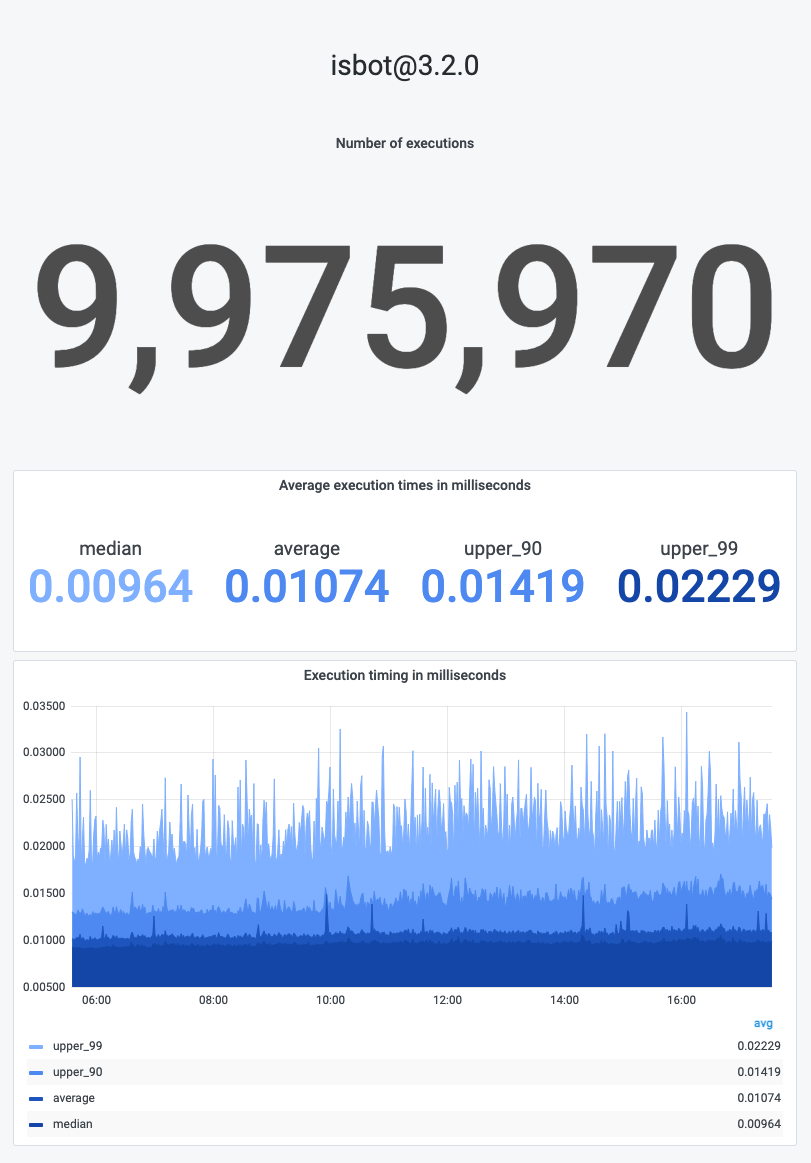@javivelasco/isbot
v3.3.3
Published
🤖 detect bots/crawlers/spiders via the user agent.
Downloads
13
Maintainers
Readme
isbot 🤖/👨🦰
Detect bots/crawlers/spiders using the user agent string.
Usage
import isbot from 'isbot'
// Nodejs HTTP
isbot(request.getHeader('User-Agent'))
// ExpressJS
isbot(req.get('user-agent'))
// Browser
isbot(navigator.userAgent)
// User Agent string
isbot('Mozilla/5.0 (iPhone; CPU iPhone OS 6_0 like Mac OS X) AppleWebKit/536.26 (KHTML, like Gecko) Version/6.0 Mobile/10A5376e Safari/8536.25 (compatible; Googlebot/2.1; +http://www.google.com/bot.html)') // true
isbot('Mozilla/5.0 (Windows NT 6.1) AppleWebKit/537.36 (KHTML, like Gecko) Chrome/41.0.2228.0 Safari/537.36') // falseAdditional functionality
Extend: Add user agent patterns
Add rules to user agent match RegExp: Array of strings
isbot('Mozilla/5.0') // false
isbot.extend([
'istat',
'^mozilla/\\d\\.\\d$'
])
isbot('Mozilla/5.0') // trueExclude: Remove matches of known crawlers
Remove rules to user agent match RegExp (see existing rules in src/list.json file)
isbot('Chrome-Lighthouse') // true
isbot.exclude(['chrome-lighthouse']) // pattern is case insensitive
isbot('Chrome-Lighthouse') // falseFind: Verbose result
Return the respective match for bot user agent rule
isbot.find('Mozilla/5.0 (X11; Linux x86_64; rv:52.0) Gecko/20100101 Firefox/52.0 DejaClick/2.9.7.2') // 'DejaClick'Spawn: Create new instances
Create new instances of isbot. Instance is spawned using spawner's list as base
const one = isbot.spawn()
const two = isbot.spawn()
two.exclude(['chrome-lighthouse'])
one('Chrome-Lighthouse') // true
two('Chrome-Lighthouse') // falseCreate isbot using custom list (instead of the maintained list)
const lean = isbot.spawn([ 'bot' ])
lean('Googlebot') // true
lean('Chrome-Lighthouse') // falseDefinitions
- Bot. Autonomous program imitating or replacing some aspect of a human behaviour, performing repetitive tasks much faster than human users could.
- Good bot. Automated programs who visit websites in order to collect useful information. Web crawlers, site scrapers, stress testers, preview builders and other programs are welcomed on most websites because they serve purposes of mutual benefits.
- Bad bot. Programs which are designed to perform malicious actions, ultimately hurting businesses. Testing credential databases, DDoS attacks, spam bots.
Clarifications
What does "isbot" do?
This package aims to identify "Good bots". Those who voluntarily identify themselves by setting a unique, preferably descriptive, user agent, usually by setting a dedicated request header.
What doesn't "isbot" do?
It does not try to recognise malicious bots or programs disguising themselves as real users.
Why would I want to identify good bots?
Recognising good bots such as web crawlers is useful for multiple purposes. Although it is not recommended to serve different content to web crawlers like Googlebot, you can still elect to
- Flag pageviews to consider with business analysis.
- Prefer to serve cached content and relieve service load.
- Omit third party solutions' code (tags, pixels) and reduce costs.
It is not recommended to whitelist requests for any reason based on user agent header only. Instead other methods of identification can be added such as reverse dns lookup.
Data sources
We use external data sources on top of our own lists to keep up to date
Crawlers user agents:
Non bot user agents:
- user-agents npm package
- A Manual list
Missing something? Please open an issue
Major releases breaking changes (full changelog)
Version 3
Remove testing for node 6 and 8
Version 2
Change return value for isbot: true instead of matched string
Version 1
No functional change
Real world data
| Execution times in milliseconds
| -
| 






